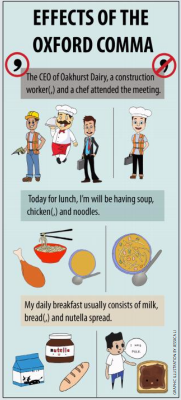Lawsuit confirms need for consensus on Oxford comma

April 27, 2017
In a recent Maine court case ruling, the lack of an Oxford — or serial — comma in Maine’s overtime laws cost Oakhurst Dairy, a Maine-based dairy company, $10 million. The Oxford comma is an optional comma that is used before an “and” or “or” when listing out three or more items. Yet because this single incident instigated an entire court case and cost a company exorbitant amounts, the use of an Oxford comma should no longer be optional and should be written into Strunk and White, the American English writing style guide, in order to preclude the prospect of future confusion.
Oakhurst Dairy’s milk truck drivers observed the want of the Oxford comma in Maine’s overtime laws, which explicitly state that overtime pay does not apply to the following:
The canning, processing, preserving, freezing, drying, marketing, storing, packing for shipment or distribution of:
(1) Agricultural produce;
(2) Meat and fish products; and
(3) Perishable foods.
Due to the lack of an Oxford comma between the words “shipment” and “or,” it is unclear as to whether the law is trying to exempt overtime pay for the distribution of the three categories that follow, or for the packing for the shipping or distribution of them. Had there been a comma after “shipment,” it would have been evident that the law exempted the overtime pay for the distribution of the three categories.
“What I think this law meant to convey, not necessarily what it grammatically implies, is that overtime pay for the canning, processing, preserving, freezing, drying, marketing, storing, packing for shipment, or distribution of the listing three products, does not apply,” said sophomore Meghna Kaligolta. “The comma placements are a little misleading, however. One can interpret differently, thinking that this law intends to exempt specifically packing for the shipping. If the Oxford comma was added, right after the word shipment, this law would have made complete sense to everybody.”
Believing that they performed certain items on this overtime law, Oakhurst’s milk truck drivers filed a lawsuit against the company about being eligible for overtime pay, and the U.S. Appeals Court sided with them. The Court claimed that the absence of an Oxford comma does indeed render the overtime pay exemptions ambiguous and further maintained that in an ambiguous situation, labor laws are structured to benefit employees. Such benefit, in this case, would mean that Oakhurst Dairy pay its milk truck drivers $10 million for working overtime. Oakhurst Dairy conceded that the statement is ambiguous as well but contended that it has a “latent clarity” as to what the law is truly trying to convey.
“It may seem like using or not using a comma is a very minor issue at first, but as you can tell through this case, it does matter,” said freshman Nisha Fernandez. “If you provide evidence showing that this comma did affect someone by $10 million, which is a lot of money, you can see the difference that one punctuation can make in the English language.”
It may be argued that the Oxford comma was omitted in Maine’s overtime law because the state guidelines instruct drafters to eschew the commas. Yet, an Oxford comma is, in fact, used later on in the statement between the words “products” and “and” in clause (2), thus contradicting this argument. Aside from utilizing them in legal statutes, Oxford commas should be used in general to clarify long lists of items instead of detracting them. For example, the following sentence: “I would like to thank my parents, Hanna and Sharon” confuses the readers as to whether “Hanna and Sharon” are the parents or whether the “parents, Hanna, and Sharon” are all separate beings. Moreover, Oxford commas force readers to pause and help eliminate the sense of overwhelmedness one may experience. The Main overtime law, for instance, is without the Oxford comma and therefore induces the feeling of being breathless; because of such instances, the Oxford comma should therefore be utilized as a means of eliminating this sense of breathlessness and ambiguity.
“I personally like to use the Oxford comma because it helps you separate different lists or ideas,” said World Literature and AP Language and Composition teacher Naomi Rollins. “By leaving off that last comma before the “and” [in a list of items] makes the sentence feel incomplete. ”
Opponents of the Oxford comma, however, contend that the comma itself is pretentious or does not ease clarity. Yet both of these arguments can easily be countered: those who believe that the Oxford comma is excessive do not understand that haughtiness does not stem from the punctuation, but rather from the tone or manner the author writes in; those who believe that the comma does not ease clarity are not playing around with the syntax or wording of the sentence enough. For instance, the following sentence: “I met my dad, Chris and Mary” can easily be rearranged to “I met Chris, Mary, and my dad.”
Instead of having to cope with the vagaries of judgment calls, it should merely be agreed upon nationally that the Oxford comma be employed all the time. After all, if it means saving $10 million, then taking an additional second to draw or type in a curved line will be long worth it.



























































